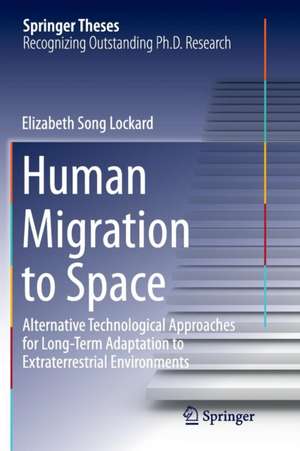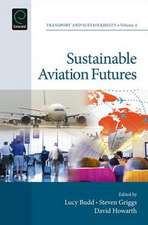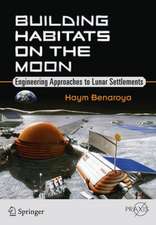Human Migration to Space: Alternative Technological Approaches for Long-Term Adaptation to Extraterrestrial Environments: Springer Theses
Autor Elizabeth Song Lockarden Limba Engleză Paperback – 23 aug 2016
| Toate formatele și edițiile | Preț | Express |
|---|---|---|
| Paperback (1) | 941.05 lei 6-8 săpt. | |
| Springer International Publishing – 23 aug 2016 | 941.05 lei 6-8 săpt. | |
| Hardback (1) | 951.29 lei 6-8 săpt. | |
| Springer International Publishing – 28 mai 2014 | 951.29 lei 6-8 săpt. |
Din seria Springer Theses
- 18%
 Preț: 997.88 lei
Preț: 997.88 lei -
 Preț: 389.88 lei
Preț: 389.88 lei - 15%
 Preț: 646.94 lei
Preț: 646.94 lei - 18%
 Preț: 943.43 lei
Preț: 943.43 lei -
 Preț: 399.29 lei
Preț: 399.29 lei - 18%
 Preț: 944.99 lei
Preț: 944.99 lei - 15%
 Preț: 636.80 lei
Preț: 636.80 lei - 18%
 Preț: 941.05 lei
Preț: 941.05 lei - 15%
 Preț: 643.16 lei
Preț: 643.16 lei - 15%
 Preț: 642.68 lei
Preț: 642.68 lei - 18%
 Preț: 1103.62 lei
Preț: 1103.62 lei - 20%
 Preț: 558.82 lei
Preț: 558.82 lei - 18%
 Preț: 1112.30 lei
Preț: 1112.30 lei - 18%
 Preț: 944.19 lei
Preț: 944.19 lei - 18%
 Preț: 1109.92 lei
Preț: 1109.92 lei - 18%
 Preț: 1217.27 lei
Preț: 1217.27 lei - 15%
 Preț: 640.06 lei
Preț: 640.06 lei - 15%
 Preț: 636.45 lei
Preț: 636.45 lei - 15%
 Preț: 640.06 lei
Preț: 640.06 lei - 15%
 Preț: 640.88 lei
Preț: 640.88 lei -
 Preț: 389.70 lei
Preț: 389.70 lei - 20%
 Preț: 563.89 lei
Preț: 563.89 lei -
 Preț: 393.35 lei
Preț: 393.35 lei - 15%
 Preț: 637.93 lei
Preț: 637.93 lei - 15%
 Preț: 641.85 lei
Preț: 641.85 lei - 18%
 Preț: 1225.94 lei
Preț: 1225.94 lei - 20%
 Preț: 551.36 lei
Preț: 551.36 lei - 18%
 Preț: 1229.10 lei
Preț: 1229.10 lei - 15%
 Preț: 639.25 lei
Preț: 639.25 lei - 18%
 Preț: 999.45 lei
Preț: 999.45 lei - 15%
 Preț: 640.06 lei
Preț: 640.06 lei - 18%
 Preț: 1220.45 lei
Preț: 1220.45 lei - 18%
 Preț: 1116.26 lei
Preț: 1116.26 lei - 18%
 Preț: 1110.72 lei
Preț: 1110.72 lei - 18%
 Preț: 1000.87 lei
Preț: 1000.87 lei - 18%
 Preț: 891.17 lei
Preț: 891.17 lei - 15%
 Preț: 640.06 lei
Preț: 640.06 lei - 5%
 Preț: 1154.07 lei
Preț: 1154.07 lei - 15%
 Preț: 635.96 lei
Preț: 635.96 lei - 15%
 Preț: 640.88 lei
Preț: 640.88 lei -
 Preț: 387.20 lei
Preț: 387.20 lei - 18%
 Preț: 1109.92 lei
Preț: 1109.92 lei -
 Preț: 385.25 lei
Preț: 385.25 lei -
 Preț: 385.25 lei
Preț: 385.25 lei - 18%
 Preț: 1112.30 lei
Preț: 1112.30 lei - 18%
 Preț: 999.45 lei
Preț: 999.45 lei -
 Preț: 386.99 lei
Preț: 386.99 lei - 15%
 Preț: 637.13 lei
Preț: 637.13 lei - 20%
 Preț: 554.20 lei
Preț: 554.20 lei - 20%
 Preț: 555.57 lei
Preț: 555.57 lei
Preț: 941.05 lei
Preț vechi: 1147.63 lei
-18% Nou
Puncte Express: 1412
Preț estimativ în valută:
180.07€ • 188.00$ • 149.03£
180.07€ • 188.00$ • 149.03£
Carte tipărită la comandă
Livrare economică 04-18 aprilie
Preluare comenzi: 021 569.72.76
Specificații
ISBN-13: 9783319358956
ISBN-10: 3319358952
Pagini: 224
Ilustrații: XVIII, 205 p. 45 illus., 37 illus. in color.
Dimensiuni: 155 x 235 x 12 mm
Greutate: 0.32 kg
Ediția:Softcover reprint of the original 1st ed. 2014
Editura: Springer International Publishing
Colecția Springer
Seria Springer Theses
Locul publicării:Cham, Switzerland
ISBN-10: 3319358952
Pagini: 224
Ilustrații: XVIII, 205 p. 45 illus., 37 illus. in color.
Dimensiuni: 155 x 235 x 12 mm
Greutate: 0.32 kg
Ediția:Softcover reprint of the original 1st ed. 2014
Editura: Springer International Publishing
Colecția Springer
Seria Springer Theses
Locul publicării:Cham, Switzerland
Cuprins
Chapter 1: Introduction.- Chapter 2: Current Directions in Space Exploration.- Chapter 3: Shifting from Habitation to Adaptation in Space.- Chapter 4: Alternative technological Interfaces with the space Environment.- Chapter 5: The Case for an Integrative Approach.- Chapter 6: Futures of Human Evolution.- Chapter 7: Conclusion.- Bibliography.
Notă biografică
Liza Lockard is an Assistant Professor in the Environmental and Interior Design program at Chaminade University. She has a Masters in Architecture from Yale University and a Ph.D. in Futures Studies from University of Hawai‘i at Manoa. Prior to her arrival at Chaminade, she practiced architecture in the U.S., Vietnam, Switzerland, and Costa Rica, and previously taught at the University of Hawai‘i School of Architecture. Her current research focuses on how architecture could be used for future human space exploration needs.
Textul de pe ultima copertă
As humans embark upon the next phase of Space exploration—establishing human outposts in low-Earth orbit, on the Moon, and on Mars—the scope of human factors must expand beyond the meager requirements for short-term missions to Space to include issues of comfort and well-being necessary for long-term durations. However, to habitate—to dwell in a place—implies more than creature comforts in order to adapt. Human factors research must also include a phenomenological perspective – an understanding of how we experience the places we live in – in order for a community to be robust and to thrive.
The first phase of migration will be an especially tenuous one requiring intensive technological intervention. The modes by which those technologies are implemented will have significant bearing on the process of human adaptation: the nature of the mediation can be either one of domination, subordination, avoidance, or integration. Ultimately, adaptation is best ensured if
symbiotic processes of negotiation and cooperation between subject and environment are espoused over acts of conquest or acquiescence.
These adaptive mechanisms will have wider implications for long-range human evolution. Migration to extraterrestrial environments will be unequivocally the most profound catalyst for evolution in the history of humankind—not only for the human species itself but also for the new environments we will eventually inhabit. At the same time, humans are also—via a new generation of bio-, nano-, and digital technologies—in the position to consciously and willfully direct evolution. Technology has always been transformative, but in the not-so-distant future, humans will soon possess the capacity for radical re-invention in almost any way conceivable.
The first phase of migration will be an especially tenuous one requiring intensive technological intervention. The modes by which those technologies are implemented will have significant bearing on the process of human adaptation: the nature of the mediation can be either one of domination, subordination, avoidance, or integration. Ultimately, adaptation is best ensured if
symbiotic processes of negotiation and cooperation between subject and environment are espoused over acts of conquest or acquiescence.
These adaptive mechanisms will have wider implications for long-range human evolution. Migration to extraterrestrial environments will be unequivocally the most profound catalyst for evolution in the history of humankind—not only for the human species itself but also for the new environments we will eventually inhabit. At the same time, humans are also—via a new generation of bio-, nano-, and digital technologies—in the position to consciously and willfully direct evolution. Technology has always been transformative, but in the not-so-distant future, humans will soon possess the capacity for radical re-invention in almost any way conceivable.
Caracteristici
Nominated by University of Hawaii Manoa as an outstanding Ph.D. thesis Considers evolutionary aspects of human migration to space and the need for new technological interfaces with the alien environment Explores how technological design and the interior architecture of the habitat can facilitate human adaptation to other planets

















